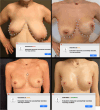Outcomes of reconstructive techniques in breast cancer using BCCT. core software
- PMID: 38519998
- PMCID: PMC10960372
- DOI: 10.1186/s12957-024-03343-3
Outcomes of reconstructive techniques in breast cancer using BCCT. core software
Abstract
Background: Surgery remains a priority for breast cancer treatment. This study aimed to compare the cosmetic outcomes of oncoplastic patients who had undergone breast-conserving surgery, mini-LDF (latissimus dorsi flap), and immediate implant reconstruction using both the Japanese scale and the BCCT.core (The Breast Cancer Conservative Treatment cosmetic results software) program and to validate this program.
Patients and methods: Patients who underwent surgery for breast cancer between 1997 and 2021 were retrospectively studied. Patients were divided into three groups: 1-those who had undergone breast-conserving surgery (245 patients, 71.3%), 2-those who had undergone mini-LDF after lumpectomy (38 patients, 11.02%), and 3- those who underwent reconstruction with implants after nipple-sparing mastectomy (61 patients, 17.68%). The patients were called for a follow-up examination, and their photos were taken. The photographs were shown to an independent breast surgeon and a plastic surgeon who was not included in the surgeries, and they were asked to evaluate and rate them according to the Japanese cosmetic evaluation scale. The same images were transferred to the computer and scored using BCCT.core.
Results: The plastic and breast surgeon evaluation results showed no significant difference between the three cosmetic techniques (p = 0.99, 0.98). The results of BCCT.core software measurements were similar to the results of plastic and breast surgeons (p: 0.43).
Conclusion: Patients are more knowledgeable about cosmetic outcomes and expect more objective data. In this study, we used 3 different cosmetic evaluation scales. We found that these techniques give results that are compatible with each other in terms of evaluating the work done in a more concrete way. For this reason, we recommend the use of such software, which offers objective results in a subjective field such as aesthetics and is very easy to apply.
Keywords: Breast cancer; Breast reconstruction; Implant reconstruction; Patient outcomes.
© 2024. The Author(s).
Conflict of interest statement
The authors declare no competing interests.
Figures
Similar articles
-
Comparison of breast cancer patients who underwent partial mastectomy (PM) with mini latissimus dorsi flap (MLDF) and subcutaneous mastectomy with implant (M + I) regarding quality of life (QOL), cosmetic outcome and survival rates.World J Surg Oncol. 2020 May 5;18(1):87. doi: 10.1186/s12957-020-01858-z. World J Surg Oncol. 2020. PMID: 32370753 Free PMC article.
-
BCCT.core - can a computer program be used for the assessment of aesthetic outcome after breast reconstructive surgery?Breast. 2012 Aug;21(4):597-600. doi: 10.1016/j.breast.2012.05.012. Epub 2012 Jun 17. Breast. 2012. PMID: 22709973
-
Nipple malposition after bilateral nipple-sparing mastectomy with implant-based reconstruction: Objective postoperative analysis utilizing BCCT.core computer software.Breast J. 2020 Jul;26(7):1270-1275. doi: 10.1111/tbj.13699. Epub 2020 Jan 10. Breast J. 2020. PMID: 31925847
-
[Oncoplastic surgery of the breast: a combination of oncological and plastic surgery].Ned Tijdschr Geneeskd. 2007 Jul 21;151(29):1623-7. Ned Tijdschr Geneeskd. 2007. PMID: 17727183 Review. Dutch.
-
Breast-sparing reconstruction with latissimus dorsi miniflaps.Eur J Surg Oncol. 2002 Dec;28(8):891-5. doi: 10.1053/ejso.2002.1350. Eur J Surg Oncol. 2002. PMID: 12477482 Review.
Cited by
-
Evaluating Surgical Results in Breast Cancer with Artificial Intelligence.Aesthetic Plast Surg. 2025 May 27. doi: 10.1007/s00266-025-04915-8. Online ahead of print. Aesthetic Plast Surg. 2025. PMID: 40425883
References
-
- Bray F, Ferlay J, Soerjomataram I, et al. Global cancer statistics 2018: GLOBOCAN estimates of incidence and mortality worldwide for 36 cancers in 185 countries. CA Cancer J Clin. 2018;68(6):394-424. - PubMed
-
- South Australian Cancer Registry Publications: Epidemiology of Cancer in South Australia- Incidence, Mortality and Survival 1977 to 1999- 23 years of data, South Australian Government 2000.
MeSH terms
LinkOut - more resources
Full Text Sources
Medical


